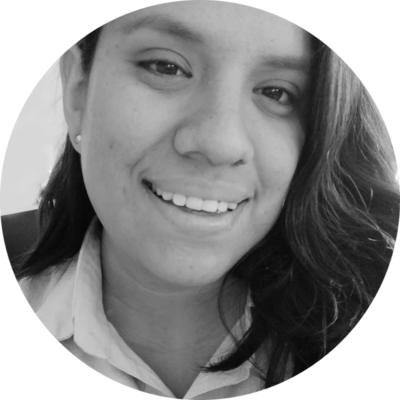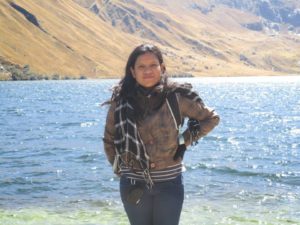
Cindy has her degree in Business Administration from the University of Piura with a specialization in Integrated Management and Entrepreneurship Systems. She has experience managing projects supported by public and private funding. In addition, she was previously the administrative manager of the northern headquarters of an aquaculture research center, a trainer in entrepreneurship and finance issues for artisanal fishermen, and the administrator of a fish marketing company, which provided fresh seafood to the most important hotel chains in northern Peru. As part of her professional aspirations, she plans to pursue a second specialization at some point in the near future, this time in the area of accounting and finance for the management of funding for social impact projects within the coastal marine sector.
Q: How did you find your way into marine issues?
I was born and raised in the coastal province of Talara in Piura, Peru, where the final glimpse of sunset in South America can be seen, as the westernmost point of South America is Punta Balcones, an inlet of Talara. All my life I was and continue to be surrounded by the sea. I am passionate about the ocean and its various actors.
My interest in what eventually became my profession in the marine field developed when I was 15 years old and my mother started a company to sell fish and shellfish to restaurants and large dining rooms in the city of Talara. Even as an adolescent I began issuing invoices, creating referral guides, etc. This experience led me to eventually choose to study business administration. Later, with more knowledge and supported by the tools that my studies offered me, I analyzed what is going on behind the scenes of each fish sale and it caught my attention: associations, value chains, cold chains, intermediaries, etc; This is how, four years ago, I decided to work in organizations that are involved in resolving issues within the value chain of artisanal fishing in order to gradually bring this knowledge to my city and contribute to its improvement.
Q: What are you most looking forward to in the next year?
Within the organization, we have set both short- and medium-term goals. I hope next year to be able to cross off those short-term goals and not only say “We did it!” but “We did it well and we generated the impact we set out to work as a team!” From my position, I will contribute to this being achieved by being backstage rowing the boat. At the individual level, I look forward to growing professionally through the specialties that I plan to add to my professional profile and to develop skills that help me achieve what I have planned.
Q: Where do you hope Peruvian global fish production will be in five years? Ten years?
I hope that within five years, the actors involved in the fishing sector in Peru will increasingly see formalization becoming regarded more and more as the standard, doing away with repetitive laws and the creation of marine protected areas that don’t affect artisanal fishing and aquaculture efforts.
In ten years, I hope that the marine areas are legally protected and defined, that protections exist for the artisanal fishing industry and that we will see more fishermen in the coves. Lastly, I hope that these same artisanal fishers are directly involved in managing their organizations so that fair trade and export movements grow through their efforts.
Q: What were you doing before you joined Future of Fish?
I was working as the administrative manager of a project publicly funded by the Ministry of Production, and in my free time, I was a trainer in entrepreneurship and finance for artisanal fishermen. I also started two ventures under the name of Puro Norte, which is currently under the supervision of a management team while I act as an advisor for financial matters.
Q: What most attracted you to working with Future of Fish?
Since starting in the coastal marine sector, I have sought to be in an organization that is focused on more than just financial and productive issues, who strives to improve the sector, that maintains open contact with the vulnerable communities, that delivers technological interventions. I found all these aspirations when I discovered Future of Fish. I dreamed of joining the team and when the opportunity arose to apply for a job I did. Being part of this non-profit organization, with clear objectives and strategies, as well as a wonderful work team, is like a professional dream come true.
Q: What do you enjoy doing when you are not working?
Outside of work, I like to enjoy time by myself and with my family. Depending on what other family members have going on, I might organize a night to watch movies or a TV series, to prepare a special meal for dinner, or maybe a dessert. And when I need time for myself, I enjoy reading, listening to music, and exercising.

Published Oct 13, 2021




